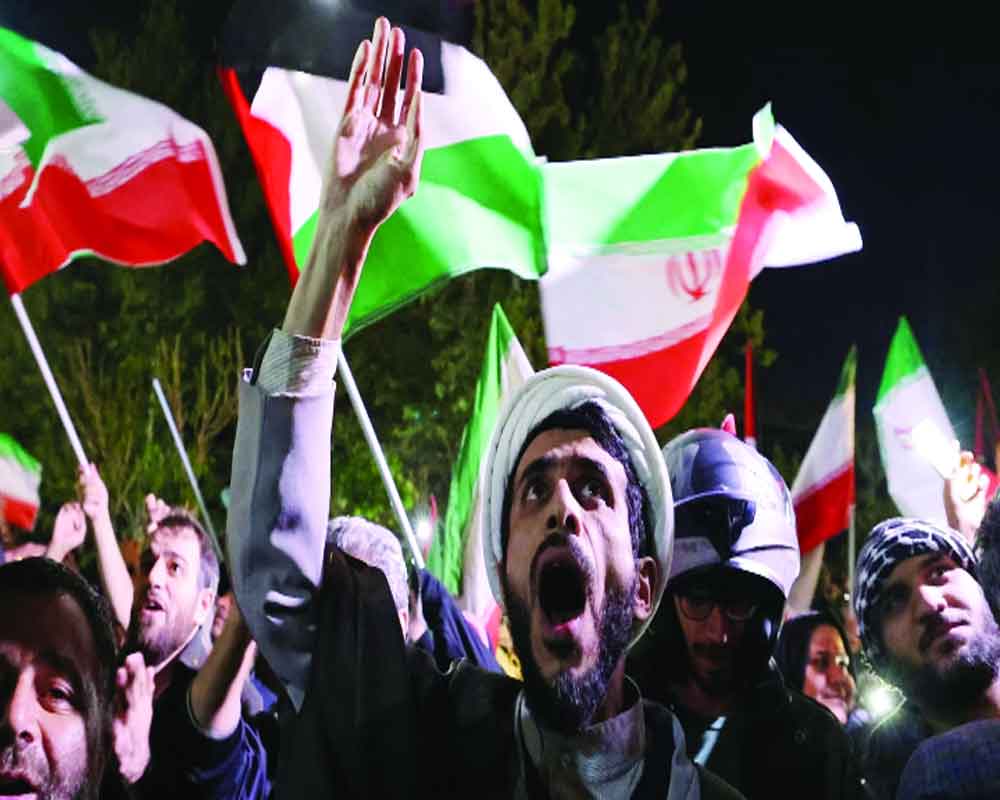Iran’s attack and Israel’s retaliation threaten to reshape the established rules of engagement and have the potential to destabilise the region
Iran launched a significant assault on Israel during the night of April 13-14, deploying 300 drones and missiles from its territory towards Israeli territories, including Jerusalem, the Golan Heights and the southern Negev. This bold action marks an unprecedented event since Israel’s founding in 1948.
The attack on Israel by Iran was a direct response to an airstrike on the Iranian consulate in Damascus, Syria, on April 1, which Iran accuses Israel of carrying out. This assault resulted in the deaths of sixteen individuals, including two Revolutionary Guards generals. Iran’s drone and missile assault on Israel, lasting several hours, has reshaped the established rules of engagement between the two nations and heightened tensions in the West Asia, potentially paving the way for a broader conflict with destabilising effects on the region. The strike on Damascus was viewed as a significant Israeli action against Iranian interests in Syria, surpassing previous incidents. Iran had been issuing warnings of retaliatory actions against Israel following an earlier airstrike that destroyed Iran’s consulate in Syria, which was seen as a breach of diplomatic conventions.
Iran justified its actions by citing Article 51 of the UN Charter, following the Israeli attack on the Iranian Embassy in Damascus. The drone attack was interpreted as a message from Tehran to Tel Aviv. Despite refraining from officially declaring it as an “Act of War,” Tehran’s response aimed to prevent being dragged into a larger conflict while signalling a readiness to retaliate more forcefully to maintain regional deterrence. The targeted strikes on Israel aimed to re-establish Iranian deterrence and highlight a shift in Tehran’s approach to risk. By setting new red lines in the conflict with Israel, Iran made it clear that it would take action if Israel’s actions against Iran and its allies persisted. While some may perceive the attack as a failure due to Israel’s successful interception of Iranian drones and missiles, a more severe strike using precision-guided ballistic missiles could have inflicted greater harm on Israel with less time to react.
In simpler terms, if Iran truly intended to harm Israel, they would have kept their plans secret and employed more powerful weapons to catch Israel off guard. By providing advance notice and employing less effective tactics, it seems like Iran was issuing a warning rather than seeking to inflict serious damage. It’s akin to saying, “If you cross the line, there will be serious consequences in the future.”
In a similar fashion, Israel also retaliated with quadcopter strikes with little damage to Iran. A warning for warning if you like.
Regarding India’s stance, which maintains strategic relationships with both Iran and Israel, it finds itself walking a diplomatic tightrope due to its ties with both nations. India has a longstanding partnership with Iran, with Tehran being a major supplier of crude oil despite challenges from Western sanctions. The Chabahar Port serves as a crucial gateway for Indian goods to Afghanistan and Central Asia, given Pakistan’s restrictions on land transit. India also has robust defence and security ties with Israel, which supported India during the Kargil War and is a leading supplier of military equipment. Trade between India and Israel has grown to approximately $7.5 billion. During Italy’s presidency of the G7, leaders are expected to jointly urge Israel to show restraint following an unprecedented attack by Iran over the weekend, which involved numerous drones, ballistic missiles and cruise missiles aimed at the Jewish State.
The United States, Britain and several European Union nations have proposed expanding existing sanctions against Iran due to its involvement in Russia’s conflict in Ukraine, with a focus on restricting drone and missile transfers to Iran.
The dividing line isn’t merely between Iran and Israel or Ukraine and Russia; rather, it lies within the emerging power dynamics of these two central regions.
The Gaza conflict is impacting both Biden and Trump’s political prospects. Biden faces challenges with voters sympathetic to Palestinians, who have expressed discontent with his Gaza policy by voting “uncommitted” in Democratic primaries, potentially leading to decreased voter turnout in the upcoming presidential election. Biden’s stance on the conflict puts him in a difficult position, balancing support for Netanyahu to maintain pro-Israeli voter support while avoiding alienating progressive Democrats. If Trump returns to office, it could disrupt Western grand strategy, especially concerning support for Netanyahu’s Gaza approach and relations with European allies. The impact of the recent hostilities on the U.S. president’s approach remains uncertain. Israel has shown mixed reactions, reopening a Gaza crossing and participating in ceasefire negotiations while also indicating intentions to invade areas like Rafah. Biden’s success in brokering a peace deal would align with his grand strategy, but achieving a temporary ceasefire is just the initial step in a complex process. Prolonged conflict in the West Asia could significantly complicate broader Western geopolitical goals.
Iran is one of the most heavily armed States in the area, boasting a sizable standing army of around 5,80,000 personnel and possessing an estimated stockpile of 3,000 ballistic missiles, as indicated by Western assessments. Despite this military capability, Ayatollah Ali Khamenei, Iran’s supreme leader, has emphasized in the past six months during the Gaza conflict that Iran seeks to avoid being drawn into a broader confrontation. So, Iran is not willing to go to war, but it also remains prepared for any kind of conflict if provoked.
(The writer is an eminent expert on counter-terrorism in West Asia and advisor to cyber and aerospace Security; Views are personal)
























